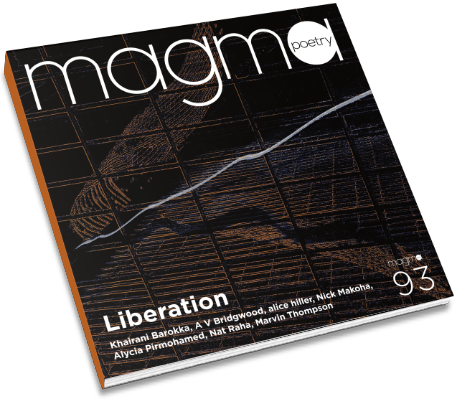When we started the editorial process, we wondered what words could do in the face of atrocity. Poetry cannot replace direct action, but it can redirect our attention amidst information overload and fatigue. To read and write a poem is to practice deep listening, to recall what we have always known. Small moments can elucidate the contours of our world.
We were three editors coming together, bringing our wide variety of cultural influences, creative backgrounds and literary tastes, seeking to foster dialogues across struggles, generations, centuries, continents and artforms. It was a process of talking heads and ungodly hours, with conversations and correspondences taking place via email and Zoom, across as many as ten time zones, and alongside our collective living and travels between Europe, Asia, Africa and North America. Occasionally, we witnessed first-hand many of the topics that are touched on in this issue, and encountered communities who have experienced them: deportations, demonstrations, fascism, censorship, the legacy of apartheid, the grief of exile…
Whilst we expected (and got) a wonderful flurry of poems, what we could not fully anticipate was the depth and variety in the work: poems exploring bodily autonomy, sexual assault, queer rights, trans identity, artistic expression, military occupation, genocides and displacement. These pressing issues urge us to invent a language beyond immediate experiences, to articulate the complexity of being human.
Elsewhere, the prose in the issue reminds us that the platforms, communities and works of art we create today are built on the foundations of those who came before us. In his article Errata of Memory, Amílcar Peter Sanatan pays tribute to the lasting impact of Anson and Sylvia Gonzales, pioneering publishers in postcolonial Trinidad and Tobago, whose tireless endeavours laid the groundwork for the poetry scene there today. In Reclaiming Lost Stories, Nick Makoha finds connections between Roman military history, Ancient Greek myth, 20th-century Kenyan literature and 1980s New York art, commingling them in his exploration of the concepts behind his ambitious collection The New Carthagians. And in the Inspired feature, poet and translator ko ko thett responds to the work and ideas of Etel Adnan, drawing stark parallels between the horrors of the Lebanese Civil War – as depicted in Adnan’s The Arab Apocalypse – and human rights abuses before and through the 2021 Myanmar military coup, as explored in his new poem Two trees (a triptych).
Our struggles do not exist in a vacuum. Our hopes – like our grief and our fortitude – echo through time. Yet the process of assembling this issue was a constant reminder that the conditions in which we make art are, for some, tenuous, brutal and subject to rapid change, requiring us therefore to be bold in keeping the arts as fair and accessible as possible.
For one of our features, we approached a poet and educator who, in recent years, has taken part in pro-Palestinian protests in the US. When asked to write an article they were initially enthusiastic, but later pulled out because they feared that their upcoming visa application would be denied. In light of America’s ongoing spate of ICE deportations, and the suppression of free speech internationally, their fears are sadly not baseless. Meanwhile, a Palestinian poet honoured us with a profound poem about living and loving in exile. Tragically, during the editing process, he learned that a friend of his had been murdered by Israel in Gaza, and he was understandably unable to continue; the poem was not completed.
This issue is filled with voices, but we also wish to honour those who could not be featured here – whether because they lacked the freedom, opportunity, privilege or strength to do so, or because they are simply no longer alive to speak. We ask that you hold them in your minds as you peruse these pages. We invite you to do more than simply read these poems; instead to inhabit them, revisit them, converse with them, make room for them in your lives – and resolve to enact your own necessary forms of liberation, as you likewise strive and advocate for the liberation of others.
*
From Magma 93

Buy this issue for £8.50 in UK (including P&P) »Buy Now

 Supported by Arts Council England
Supported by Arts Council England